Egypt, Oman exchange reaching new highs, achieving great momentum
Egypt and Oman have distinguished historical diplomatic relations that extend for more than 50 years.
These relations started under the late Sultan of Oman, Qaboos bin Said, who had strong belief in Egypt’s importance and pivotal role in the region.
The latest official two-day visit to Egypt by Sultan Haitham bin Tarik of Oman and the talks he held with President Abdel Fattah El Sisi carried great significance. The same visit had a positive impact on bilateral relations.
It came to affirm the depth of historical relations between Cairo and Muscat as well as the keenness of the two countries’ leaderships to enhance these relations.
Last November, Egypt and Oman celebrated the golden jubilee of establishing their diplomatic ties, a period which witnessed events that underlined the depth and strength of these ties.

Identical views
“The two countries share common principles and identical views on most local and global issues, including non-intervention in the affairs of other states, paying great attention to regional security and stability,” Abdullah Nasssir Al-Rahbi, the ambassador of Oman to Egypt and its permanent representative at the Arab League, said in remarks to the press recently.
Egypt’s Ambassador to Oman, Khalid Mohamed Radi, described Sultan Haitham’s visit to Egypt as ‘historic’.
“The visit has contributed to developing deep-rooted relations between the two countries,” Radi said.
He noted that over 1,900 Egyptian companies operate in Oman.
“The number of Egyptian companies in the country keeps rising, a reflection of positive ties between the two countries,” he added.
The ambassador said the Sultan’s visit to Egypt also came at a critical time, especially after the recent Arab Summit in Jeddah, and amid major changes on the international arena.
“Egypt and Oman share similar political views on various regional and international issues,” the Egyptian ambassador said.
“This stems from shared values that derive from the principles of security, peace and adherence to international law,” he added.
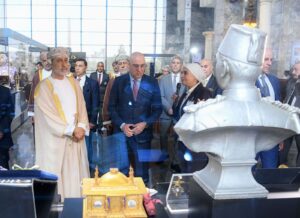
Historic ties
Egypt and Oman enjoy centuries-old cultural, political and economic relations built on people-to-people connections.
These well-established historic relations are a strong model that is capable of protecting itself against regional and international political transformations.
Egyptian-Omani relations, which date over 3,500 years back, started with cultural communication between Omanis and ancient Egyptian families.
According to historical records, co-operation between the two countries started during the reign of Queen Hatshepsut across the Red Sea in 1479 BC.
The famous Omani frankincense, an aromatic resin used in incense and perfumes, played a pivotal role in that unique cultural communication which continues unabated until today.
Oman’s support for Egypt during the 1979 Egypt-Israel peace process, which resulted in Egypt’s recapture of the rest of its land in Sinai, is perhaps one of the most well-known political positions between Oman and Egypt.
Oman has consistently supported Egypt on several issues, including the construction of the controversial Ethiopian dam, in which the Sultanate stressed the need for reaching a legally-binding agreement that meets the aspirations of all parties concerned.
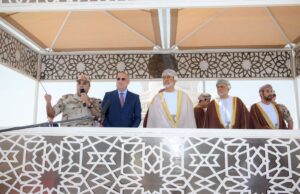
Top-level visits
Sultan Haitham’s visit to Egypt, the first since he assumed power in his country in 2020, aimed to enhance Egyptian-Omani co-operation in various fields and coordinate with Cairo on regional developments.
President Sisi said on Sunday, during his meeting with Sultan Haitham at the Presidential Palace in Cairo that Egypt is keen to boost its relations with Oman in a way that serves the interests of the peoples of both countries and the Arab world.
For his part, Sultan Haitham voiced keenness to enhance current co-operation with Egypt and open new horizons for relations in various fields during the coming period.
He praised Egypt as a strategic and a cultural depth of the Arab world and a pillar of security and stability in the region.
During their meeting, the two leaders discussed the exchange of expertise in the development of state institutions.
They also discussed the modernisation of the administrative apparatus and the implementation of governance and digitisation.
Sultan Haitham also oversaw the signing of six memorandums of co-operation with Egypt in education, the judiciary, archives, heritage, transportation, aviation and taxation.
Tour in the NAC
Sultan of Oman Haitham bin Tariq toured the New Administrative Capital (NAC) during his visit to Cairo, where he inspected the Egyptian Islamic Cultural Centre (Misr Mosque), the City of Arts and Culture, including the Opera House, the Museum of Egypt’s Capitals and a number of exhibition halls, theatres and libraries.
The Sultan voiced his admiration of the new capital, noting that its unique configuration reflects the historically deep-rooted Egyptian architecture.
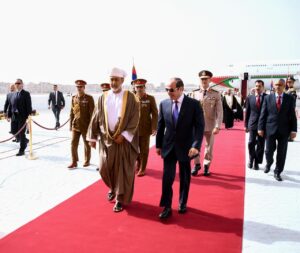
Sisi’s visits to Oman
President Sisi visited Oman for three days in February 2018. He met the late sultan Qaboos, along with a host of other senior Omani officials.
This was the first visit by an Egyptian head of state to Oman since 2009.
In 2022, President Sisi visited Muscat for two days, his first since Sultan Haitham took over the reins of power in Oman.
During the visit, Egypt and Oman signed a raft of co-operation memos in various fields.
A large number of Omani officials visited Egypt in the last three years to study the Egyptian experience in the construction of smart cities and digitising state institutions.
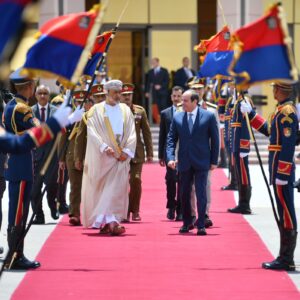
Important events
Oman’s history is replete with support to Egypt.
In 1798, Sultan bin Ahmed of Oman suspended negotiations with France in protest against the French campaign in Egypt.
In 1956, Omanis stood in solidarity with Egypt against the tripartite aggression. Oman also declared its support for Egypt.
In 1977, Sultan Qaboos refused to boycott Egypt, like other Arab states did, after the late president Anwar Sadat decided to make peace with Israel.
In 1984, Sultan Qaboos said: “It has been proven throughout the stages of contemporary history that Egypt was the main element in building the Arab entity and ranks”.
In 2013, Omani Minister of Foreign Affairs Youssef bin Alawi bin Abdullah visited Egypt to declare support for its security and stability.
In June 2014, Oman participated with a high-ranking delegation in President Sisi’s inauguration.
On August 6, 2015, Oman participated with a high-profile delegation in the opening of the new Suez Canal.
In January 2017, Sultan Qaboos issued a decree directing his government to ease the obstacles facing Egyptian workers in Oman and to allocate $250 million for investments in Egypt.
Trade exchange
Trade exchange between Egypt and Oman reached $1.1 billion in 2022, compared to $650.8 million in 2021 — an increase of 64.6%, according to the Central Agency for Public Mobilisation and Statistics (CAPMAS).
In a recent statement, CAPMAS said exports to Oman rose by 23.7% to reach $202.1 million in 2022, from $163.3 million in 2021.
Imports from Oman were up by 78.3% to $869.3 million in 2022, from $487.5 million in 2021, the agency said.
Metals and plastics worth $665.1 million and $56.7 million topped the list of imports from Oman in 2022 respectively, CAPMAS said.
Expatriate remittances from Oman totalled $162 million during the fiscal year (FY) 2020-2021, compared to $160.4 million in FY 2019-2020, the agency added.
Investments
Omani investments in Egypt have reached $80.5 million across 110 projects in the sectors of industry, agriculture, tourism, services, construction, financing, communications, and information technology, according to Minister of Trade and Industry Ahmed Samir.
Egyptian investments in Oman amounted to nearly $860 million, covering 142 projects in the fields of road construction, infrastructure, sanitation, real estate and tourism, the minister said.
Trade exchange between Egypt and Oman has been on the rise in recent years. This trend is set to continue during the coming period.
The establishment of the Oman-Egypt Joint Investment Fund, the signing of agreements promoting trade and investment, and the rise in the number of free trade zones between the two countries are all factors that contribute to this growth, the minister said.



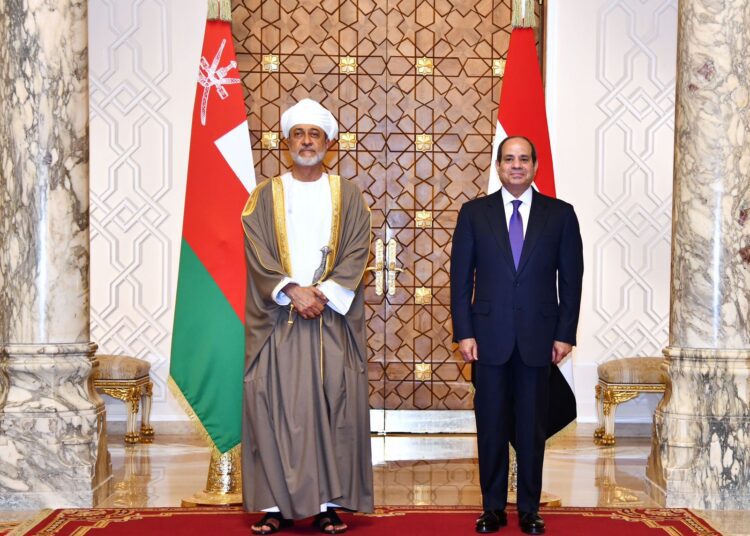


Discussion about this post